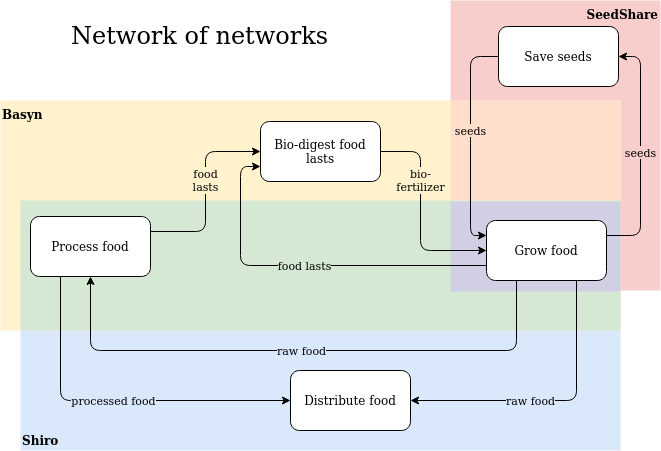Introduction to Economic Networks
- “There is growing consensus that capitalism is unsustainable and that something simply must change. It is not hard to point to the various reasons for this critique; from growing fears about the status quo’s inability to tackle climate change, to rising inequality on a global level, to the continual failure to achieve acceptable living standards in the Global South, and to the pressure of an insurmountable wealth gap between the elites and the working classes in advanced economies.
- “However, actually achieving a change to the status quo requires dismantling entrenched interests and taking on a system apt at perpetuating itself. Since regulatory and policy approaches have largely failed to achieve this change, we contend that it is time to identify, research, and implement alternative methods and strategies that may better drive systemic change.” *Social Entrepreneurship & Management Masters Thesis, Danny Nielsen and Olivia Grazzini
Several of the strategies in experiments around the world involve economic networks of one kind or another, for example:
- Distributed Cooperative Organizations (DisCOs) as described in that thesis or in their manifesto: http://disco.coop/2019/11/you-say-decentralized-i-say-potato-the-disco-manifesto-is-live-and-ready-to-download/,
- multi-stakeholder cooperatives like http://www.fifthseasoncoop.com/ ,
- mutual aid networks: https://www.mutualaidnetwork.org/ ,
- mutual credit networks like https://opencredit.network/
- open value networks like https://www.sensorica.co/ ,
- or even commercial supply chains (see The People's Republic of Walmart below).
And here's another economic network planning to form in the US pacific northwest. Basyn creates and operated biodigestors that transform food wastes into fertilizer. SeedShare saves and shares seeds. Farmers grow food using the fertilizer and send their own wastes back to Basyn. Shiro distributes and processes food, and sends their food wastes back to Basyn, too. Basyn, SeedShare, and Shiro are networks themselves, and then internetworked by Basyn.

The stated logic of capitalism is the “free market”, with it's fabled “invisible hand”, and it's less-fabled “invisible foot” which kicks the “externalities” under the table.
Economic networks shelter themselves from the “free market” except at their edges. Internally, their relations are usually cooperative, not adversarial.
That is also true of many commercial supply chains: they rely on negotiated long-term relationships. They do not go out on the free market to get their components, relying on “price signals”. For lots of details about how that works, read the book “The People's Republic of Walmart”, or this review: http://inthesetimes.com/article/21773/socialism-leigh-phillips-michal-rozworski-peoples-republic-of-walmart
Non-capitalist rules, or, cooperators rule
Internally to an economic network, the participants can set up any rules of engagement that they can agree on.
So, for example, the multiple stakeholders of the Fifth Season cooperative include regional farmers, institutions like hospitals and schools that serve food, and the workers who distribute the food and administer the network. During the formation of the cooperative, all of the initial stakeholders met in a big room, several times, and discussed what prices would be fair for both the farmers and the institutions, and what would be fair wages for the workers. Took a few rounds of negotiation, but they have now been up and running successfully for more than 10 years.
Or Sensorica, where they distribute income to whoever contributed in any way to the project that brought in the income, using a democratically-decided “value equation”. More details here: https://speakerdeck.com/mikorizal/10-nrp-value-equation-concepts-and-tutorial
The DiSCOs also want to use democratic value equations for what they call “contributive accounting”. More details here: https://disco.coop/governance-model/#Contribution_Tracking.
The history of such networks is that if any of the participants feel like they are being treated unfairly, they will drop out, and if enough of them drop out, the network will split and/or collapse. Which has happened to more than one network. See also https://www.academia.edu/10252910/The_uneasy_transition_from_supply_chains_to_ecosystems_The_value-creation_value-capture_dilemma
All of that cooperative logic is the opposite of the logic of capitalism, where each economic agent is on their own, competing with all the other players in a big winner-take-most game.
Economic network operating systems
We ( http://mikorizal.org/ ), along with several other contributors, have been working on infrastructure for economic networks, including a prototype system we developed in 2012 in collaboration with Sensorica that we called NRP for Network Resource Planning, which you can read about here: https://speakerdeck.com/mikorizal/1-nrp-overview
That software has been forked several times, including for a high school fablab network in Milwaukee Wisconsin, called https://learndeep.org/ (yet another economic network).
From that experience and many other inputs, the https://valueflo.ws/ vocabulary and protocols were developed to allow distributed economic networks of all kinds to coordinate with each other.
Value Flows has given rise to several new software projects using distributed technologies. 3.5 of them are described here: http://mikorizal.org/futures.html
Bootstrapping
This article https://docs.google.com/document/d/1NwEcKf-AlD3WlvHFNCmGmDKp9NerPeAaHeTHTrdF628/edit?usp=sharing surveys a few proposals for better economic systems, and argues that a new economic system in North America or Europe will probably not result from a revolution as in the Soviet Union, China, or Cuba. We don't have the forces at this stage, for any definition of we, and even if we did, do we really know how to create a better system at that scale, as of now or the near future?
So maybe a better way to go is to bootstrap new-economy experiments as economic networks, work out the relationships and logic until some good models emerge, and then internetwork them into more of a full economic system. Remains to be seen if these experimental networks need to be local, based on the ground, or if they can just be digital, on the internet. Both are happening, but can a purely digital network, even if it facilitates some transfers of physical goods, provide for enough of a whole economy to provide any useful lessons?